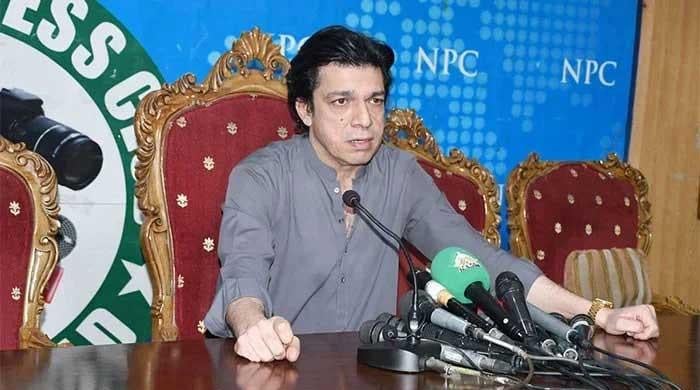Asif Ali Zardari: From Mr 10% to Mr President
They used to say that you can love Bhutto or hate him, you cannot ignore him; the same can be said of Asif Ali Zardari
March 11, 2021
On April 6, 1972, Cadet College Petaro — a high-profile boarding school in Jamshoro, Sindh — expelled four students and forbade them from ever stepping foot in the college premises again.
The youngsters were accused of hatching a plot to take over the administration and tamper with college files.
One of the conspirators was Asif Ali Baluch, today known as Asif Ali Zardari.
Other famous alumni of the college include Dr Asim Hussain, Agha Siraj Durrani and Ghani Ansari.
One of Zardari’s old friends remembers him as being full of life in his college days. “It was fun when Zardari became captain of the Jinnah House.”
The friend added that post-Petaro, the young Zardari enjoyed going to parties along with his college mate, Dr Zulfiqar Mirza.
“It was like a jawani deewani wali life,” he recalled, chuckling.
Zardari later entered politics, and it was by no means an accidental entry.
Entry into politics
Asif Ali Zardari's father, Hakim Ali Zardari, was among the founding members of the Pakistan Peoples Party. However, he was also part of a group that later left the PPP and joined the National Democratic Party. The elder Zardari only rejoined his former party after Benazir Bhutto returned to Pakistan on April 10, 1986.
Hakim Ali Zardari's wife was particularly close to Benazir Bhutto’s mother, Nusrat Bhutto. A year later, their bond was cemented when Asif Ali Zardari wed Benazir Bhutto.
For many, it was a surprising decision: but Benazir Bhutto’s close friends say she was under immense pressure to tie the knot if she wanted to continue her political journey in Pakistan.
The marriage marked the beginning of Asif Ali Zardari’s controversial political trajectory. He remained in the news for almost 25 years, and almost always for the wrong reasons.
'Either in prison or in PM House'
When his wife was prime minister, Zardari was constantly dogged by allegations of corruption. He was also incarcerated for several years on multiple charges, including murder, money laundering and corruption.
Benazir Bhutto once famously said of her husband: “If you want to meet him, you can find him either in prison or at Prime Minister House.”
Zardari proved his political dexterity when a vote of no-confidence was tabled against Benazir Bhutto only nine months after she took office as prime minister.
The motion came as a shock to Bhutto, as not only had she accepted the conditions of the establishment, but even given the controversial Tamgha-e-Jamhuriat (Medal of Democracy) to then army chief Mirza Aslam Baig.
“They betrayed me,” was her first reaction when she came to know about the motion against her. It was then that Zardari stepped up and assured her the motion would be defeated.
Bhutto survived the vote of no confidence.
Both sides allegedly used large amounts of money, including from “secret funds’. Thereafter, Zardari was either in prison or in PM house, as his wife famously said.
An enigmatic man
I had a chance of meeting Zardari in 1990, outside a courtroom, after a hearing of his case. That day, I was walking towards the Press Club when a black Mercedes stopped near me.
“Come, I’ll drop you,” said a man seated inside. It was Asif Ali Zardari. I refused, but my friends insisted that we hop in, in case we get a good scoop.
Once, while travelling with him on a plane, he told me that when he was released from prison after eight years, he left some of his belongings behind in his cell.
“I knew the government would want me back there sooner or later,” he said.
When the plane landed at the Islamabad airport, a police officer told him his bail had been cancelled and he had to take Zardari back to Karachi. The politician turned to me and said: “See? I either go to Islamabad or to jail. Hope to meet you soon.”
The last time I interviewed Zardari was in 2008, just days before he became the president of Pakistan.
Before the interview, he took me into a separate room and asked me, “Do you think I should head the government?” I told him that that was entirely his decision.
Zardari’s influence on the PPP
Bhutto’s friends believe that the former prime minister changed her style of populist and revolutionary politics from the days of Gen Ziaul Haq to the years of Gen Pervez Musharraf on Zardari’s insistence.
What did not change was her spirit to fight through street agitation.
Bhutto’s decision to return after breaching the infamous NRO agreement clearly reflected that she wanted to remain amongst the masses, which in the end took her life.
After her death, the style of PPP’s politics and narrative shifted from that of Bhutto’s to that of Zardari’s.
Zardari soon became the co-chairman of the party and secured a win for the PPP in the 2008 election. He allowed General Musharraf to leave Pakistan and made peace with Bhutto’s old rivals, the Chaudhrys of Gujrat.
The Chaudhrys had a bitter history with the Bhuttos. They accused Zulfiqar Ali Bhutto of killing their father. In fact, when the Lahore High Court sentenced Bhutto to death, the Chaudhry sons kept the pen with which the infamous judgement was written.
But, upon meeting Zardari, Chaudhry Pervez Elahi said: “I came here to bury the past as I don’t want our children to live like rivals.”
Similarly, Zardari had a love-hate relationship with the Sharif family.
In 2015, when Zardari’s close friend, Dr Asim Hussain, was arrested, the former president was livid. He accused the Sharifs of backstabbing him.
Later, Zardari was instrumental in dislodging the Sharif government by first playing a role in Balochistan to wipe out PML-N and then in the 2018 elections as well.
Interestingly, Prime Minister Imran Khan’s first encounter with Asif Ali Zardari was in 1995, when the former went to the headquarters of the state television channel to get a time slot to raise funds for his cancer hospital.
“I was surprised when the PTV bosses told me that they required an NOC from the PM House,” Khan told me later. Imran Khan then went to PM House but the prime minister was busy and could not meet him. So he met Zardari, who, according to Khan, asked him to join the PPP.
His legacy
They used to say about Zulfiqar Ali Bhutto that you can love him or hate him, but you cannot ignore him. The same can be said of Zardari today.
Zardari seems to have perfected the art of making possible what seems impossible. He proved it again last week, when Yousaf Raza Gilani clinched the Islamabad seat despite being in the minority Opposition.
From the young boy who was expelled from college, to Mr. 10%, to Mr. President, the slogan “aik Zardari sub be bhari” has become part of Pakistani political lore.
What is next on his political chessboard? We won’t have to wait long: the Senate chairman elections are tomorrow. Can Zardari surprise us all again?
Abbas is a senior columnist and analyst of GEO, The News and Jang. He @MazharAbbasGEO









